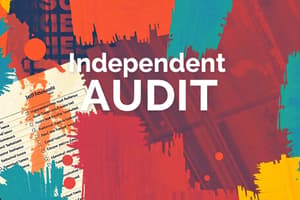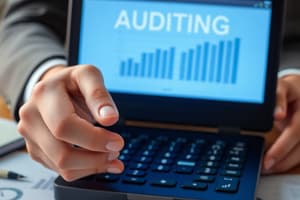Podcast
Questions and Answers
Peristiwa yang tejadi setelah tanggal neraca yang memberikan bukti kondisi yang tidak ada pada tanggal neraca tetapi muncul setelah tanggal tersebut termasuk dalam tipe ______ peristiwa yang tejadi selanjutnya.
Peristiwa yang tejadi setelah tanggal neraca yang memberikan bukti kondisi yang tidak ada pada tanggal neraca tetapi muncul setelah tanggal tersebut termasuk dalam tipe ______ peristiwa yang tejadi selanjutnya.
kedua
Untuk peristiwa yang sangat signifikan dari tipe kedua, laporan keuangan dapat dilengkapi dengan ______ keuangan pro forma atau pernyataan yang memberikan efek pada peristiwa tersebut seolah-olah telah tejadi pada tanggal neraca.
Untuk peristiwa yang sangat signifikan dari tipe kedua, laporan keuangan dapat dilengkapi dengan ______ keuangan pro forma atau pernyataan yang memberikan efek pada peristiwa tersebut seolah-olah telah tejadi pada tanggal neraca.
data
Standar profesional mengharuskan auditor untuk mempertimbangkan beberapa faktor ketika mengungkapkan ______ yang tejadi selanjutnya.
Standar profesional mengharuskan auditor untuk mempertimbangkan beberapa faktor ketika mengungkapkan ______ yang tejadi selanjutnya.
peristiwa
Masa waktu setelah tanggal neraca yang dikenal sebagai '______ period' berlangsung hingga tanggal laporan auditor.
Masa waktu setelah tanggal neraca yang dikenal sebagai '______ period' berlangsung hingga tanggal laporan auditor.
Apa perbedaan antara penyesuaian atas peristiwa yang tejadi selanjutnya dan pengungkapan yang tidak disesuaikan?
Apa perbedaan antara penyesuaian atas peristiwa yang tejadi selanjutnya dan pengungkapan yang tidak disesuaikan?
Bagaimana auditor dapat mengintegrasikan prosedur peristiwa yang tejadi selanjutnya ke dalam program audit?
Bagaimana auditor dapat mengintegrasikan prosedur peristiwa yang tejadi selanjutnya ke dalam program audit?
Laporan auditor harus memuat paragraf penjelasan yang mengarahkan perhatian pembaca kepada ______ yang tejadi selanjutnya dan efeknya pada laporan keuangan.
Laporan auditor harus memuat paragraf penjelasan yang mengarahkan perhatian pembaca kepada ______ yang tejadi selanjutnya dan efeknya pada laporan keuangan.
Mengapa auditor harus membatasi panjangnya masa peristiwa yang tejadi selanjutnya?
Mengapa auditor harus membatasi panjangnya masa peristiwa yang tejadi selanjutnya?
Bagaimana auditor dapat memastikan bahwa semua anggota tim audit memiliki pengetahuan yang memadai tentang klien dan industri?
Bagaimana auditor dapat memastikan bahwa semua anggota tim audit memiliki pengetahuan yang memadai tentang klien dan industri?
Mengapa pengungkapan peristiwa yang tejadi selanjutnya penting dalam laporan keuangan?
Mengapa pengungkapan peristiwa yang tejadi selanjutnya penting dalam laporan keuangan?
Flashcards are hidden until you start studying
Study Notes
Audit and Subsequent Events: Disclosure Requirements
Auditing and accounting standards require auditors to search for, evaluate, and ensure the proper disclosure of subsequent events (SEs). These events refer to those that occur after the balance-sheet date but prior to the issuance of the financial statements, and can have a material impact on the financial statements. In this context, SEs are further categorized into two types: those that provide additional evidence of conditions that existed at the balance-sheet date and those that provide evidence of conditions that did not exist at the balance-sheet date but arose subsequent to it.
Subsequent Events Disclosure
The first type of subsequent events consists of those that provide additional evidence of conditions that existed at the balance-sheet date and affect the estimates inherent in the process of preparing the financial statements. These events require adjustment of the financial statements to reflect the changes in estimates. The financial statements should be adjusted for any changes in estimates resulting from the use of relevant evidence provided by these events. Examples of such events include losses on receivables due to a customer's deteriorating financial condition leading to bankruptcy or a loss due to a customer's major casualty such as a fire or flood.
The second type of subsequent events consists of those that provide evidence of conditions that did not exist at the balance-sheet date but arose subsequent to that date. These events do not require adjustment of the financial statements, but disclosure of the event may be necessary to prevent the financial statements from being misleading. For extremely significant events of this type, the financial statements can be supplemented with pro forma financial data or statements that give effect to the event as if it had occurred on the balance-sheet date. In certain cases, an explanatory paragraph directing the reader's attention to the event and its effects may be included in the auditor's report.
Disclosure Considerations
Professional standards require auditors to consider several factors when disclosing subsequent events:
-
SE Period: Auditors should be aware of the period after the balance-sheet date, known as the "subsequent period," which extends to the date of the auditor's report. The duration of this period depends on the practical requirements of each audit and may vary from a relatively short period to several months.
-
Auditing Procedures: Auditors should perform specific auditing procedures to detect the occurrence of subsequent events that may require adjustment or disclosure. These procedures may include examining data to assure that proper cutoffs have been made and examining data that provide information to aid the auditor in evaluating assets and liabilities as of the balance-sheet date.
-
Financial Statements: Financial statements should be adjusted for subsequent events of the first type, while disclosure of subsequent events of the second type may be necessary to keep the financial statements from being misleading. Pro forma financial data or statements may be included in the financial statements to give effect to events of the second type.
-
Auditor's Report: The auditor's report should include an explanatory paragraph directing the reader's attention to significant subsequent events and their effects on the financial statements. However, no reference to the event should be made in the opinion paragraph of the report.
In conclusion, subsequent events disclosure is a crucial aspect of auditing and accounting. Auditors must ensure that all relevant events are properly disclosed in accordance with accounting standards to prevent financial statements from being misleading.
Studying That Suits You
Use AI to generate personalized quizzes and flashcards to suit your learning preferences.




